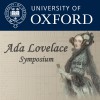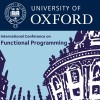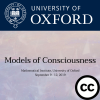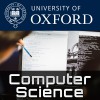Department of Computer Science

Relevant Links
The Department of Computer Science, University of Oxford, is consistently recognised as the internationally leading centre of research and teaching across a broad spectrum of computer science, ranging from foundational discoveries to interdisciplinary work with significant real-world impact.
The department is proud of its history as one of the longest-established computer science departments in the country, as it continues to provide first-rate undergraduate and postgraduate teaching to some of the world's brightest minds. It enjoys close links with other University departments and Oxford research groups and institutes.
Series associated with Department of Computer Science
| # | Episode Title | Description | People | Date | |
|---|---|---|---|---|---|
| 158 | Advances in Garbled Circuits | MT25 Strachey Lecture - Professor Rafail Ostrovsky: Advances in Garbled Circuits | Rafail Ostrovsky | 27 Oct 2025 | |
| 157 | Will Computers prove theorems? | Kevin Buzzard: Will Computers prove theorems? | Kevin Buzzard | 15 May 2025 | |
| 156 | Formalizing the Future: Lean’s Impact on Mathematics, Programming, and AI | Leo De Moura: Formalizing the Future: Lean’s Impact on Mathematics, Programming, and AI | Leo De Moura | 15 May 2025 | |
| 155 | Privacy, Verification, Robustness: A Cryptographer's perspective on ML | Strachey Lecture: Privacy, Verification, Robustness: A Cryptographer's perspective on ML | Shafi Goldwasser | 11 Mar 2025 | |
| 154 | From probabilistic bisimulation to representation learning via metrics | Strachey Lecture: From probabilistic bisimulation to representation learning via metrics - Professor Prakash Panangaden | Prakash Panangaden | 02 Dec 2024 | |
| 153 | Strachey Lecture: The Computer in the Sky | The talk will emphasize the diversity of mathematical tools necessary for understanding blockchain protocols and their applications | Tim Roughgarden | 16 May 2024 | |
| 152 | Strachey Lecture: From classical to non-classical stochastic shortest path problems | Professor Christel Baier delivers the Hillary Term 2024 Strachey Lecture | Christel Baier | 06 Feb 2024 | |
| 151 | Strachey Lecture: How Can Algorithms Help to Protect our Privacy | In this term's Strachey lecture, Professor Monika Henzinger gives an introduction to differential privacy with an emphasis on differential private algorithms that can handle changing input data. | Monika Henzinger | 13 Nov 2023 | |
| 150 | Strachey Lecture: Use or Be Used - Regaining Control of AI | It’s said that Henry Ford’s customers wanted “a faster horse”. If Henry Ford was selling us artificial intelligence today, what would the customer call for, “a smarter human”? | Neil Lawrence | 04 Sep 2023 | |
| 149 | Strachey Lecture: Symmetry and Similarity | An introduction to algorithmic aspects of symmetry and similarity, ranging from the fundamental complexity theoretic "Graph Isomorphism Problem" to applications in optimisation and machine learning | Martin Grohe | 16 Feb 2023 | |
| 148 | Strachey Lecture: Integrating Logic, Probability and Neuro-Symbolic Reasoning using Probabilistic Soft Logic | An overview of work on probabilistic soft logic (PSL), an SRL framework for large-scale collective, probabilistic reasoning in relational domains and a description of recent work which integrates neural and symbolic (NeSy) reasoning. | Lise Getoor | 27 Oct 2022 | |
| 147 | That's a Wrap! | Resilience, cool communicators and space robots. This episode wraps a brilliant season of PTNPod, with Ari and Claudine's favourite 5 moments. | Arianna Schuler Scott, Claudine Tinsman | 11 Jul 2022 | |
| 146 | Value & Benefits | SPECIAL CONFERENCE EPISODE getting the inside scoop on UK Cyber Strategy. | Arianna Schuler Scott, Chris Ensor, Bernard Parsons, Harmonie Toros | 04 Jul 2022 | |
| 145 | Relevant & Useful | We discuss communication challenges and pipeline problems in cyber security. | Arianna Schuler Scott, Claudine Tinsman, Andrew Martin, Louise Axon | 27 Jun 2022 | |
| 144 | Raising the Bar | Surprising social media harms and the Online Safety Bill. This week we're talking about Claudine's research into long term harms of social media content and managing the 'mundane'. | Arianna Schuler Scott, Claudine Tinsman | 24 Jun 2022 | |
| 143 | Power to the Ppl | Data protection and making consent more of a conversation. Listen up, and prosper! | Arianna Schuler Scott, Claudine Tinsman | 09 Jun 2022 | |
| 142 | Creative Commons | Voice Hackers R Us | We’re learning about speech interfaces and hacking home assistants with nonsense and wordplay. | Arianna Schuler Scott, Claudine Tinsman, Mary Bispham | 28 May 2022 |
| 141 | Creative Commons | We are what we do | Instead of passwords, what if computers used our high fives to log us in? | Arianna Schuler Scott, Claudine Tinsman, Klaudia Krawiecka | 22 May 2022 |
| 140 | Creative Commons | Make or Break | Join us as we explore how to describe trust, reputation and messiness using maths! | Arianna Schuler Scott, Claudine Tinsman, Sean Sirur | 16 May 2022 |
| 139 | Creative Commons | Rethinking Risk | Sometimes threats come from inside the system (content warning: intimate partner violence). | Arianna Schuler Scott, Claudine Tinsman, Julia Slupska | 10 May 2022 |
| 138 | Creative Commons | The Kids aren’t OK | Designing and building apps to protect children and young folk from data harms. | Arianna Schuler Scott, Claudine Tinsman, Anirudh Ekambaranathan | 20 Apr 2022 |
| 137 | Creative Commons | Technospheres | Political influence and the trading power of surveillance and censorship technologies. | Arianna Schuler Scott, Claudine Tinsman, Valentin Weber | 20 Apr 2022 |
| 136 | Creative Commons | Networks of Hate | Exploring how hate groups use, lose and abuse social media networks. | Arianna Schuler Scott, Claudine Tinsman, Fatima Zahrah | 20 Apr 2022 |
| 135 | Creative Commons | Intro | Welcome to Proving the Negative, a podcast exploring the wide wonderful world of cyber security research. | Arianna Schuler Scott, Claudine Tinsman | 20 Apr 2022 |
| 134 | Strachey Lecture: How Are New Technologies Changing What We See? | There has been a proliferation of technological developments in the last few years that are beginning to improve how we perceive, attend to, notice, analyse and remember events, people, data and other information. | Yvonne Rogers | 16 Mar 2022 | |
| 133 | Strachey Lecture: Mixed Signals | Mixed Signals: audio and wearable data analysis for health diagnostics | Cecilia Mascolo | 06 Jan 2022 | |
| 132 | Strachey Lecture: The Quest for Truth in the Information Age | The advantages of computing for society are tremendous. But while new technological developments emerge, we also witness a number disadvantages and unwanted side-effects. | Sonja Smets | 04 Nov 2021 | |
| 131 | Strachey Lecture: Getting AI Agents to Interact and Collaborate with Us on Our Terms | As AI technologies enter our everyday lives at an ever increasing pace, there is a greater need for AI systems to work synergistically with humans. | Subbarao Kambhampati | 12 May 2021 | |
| 130 | Strachey Lecture: How Innovation Works - Serendipity, Energy and the Saving of Time | Innovation is the main event of the modern age, the reason we experience both dramatic improvements in our living standards and unsettling changes in our society. | Matt Ridley | 12 May 2021 | |
| 129 | Strachey Lecture: Medicine and Physiology in the Age of Dynamics | Medicine and Physiology in the Age of Dynamics: Newton Abraham Lecture 2020 | Alan Garfinkel | 02 Apr 2020 | |
| 128 | A Problem for Lambert | Lecture at 65th Birthday Symposium for Lambert Meertens, 22nd January 2010 | Richard Bird | 24 Feb 2020 | |
| 127 | An Introduction to the Theory of Lists | Lectures at Utrecht University, 16th and 17th December 1986. | Richard Bird | 24 Feb 2020 | |
| 126 | Strachey Lecture: Can one Define Intelligence as a Computational Phenomenon? | Can we build on our understanding of supervised learning to define broader aspects of the intelligence phenomenon. Strachey Lecture delivered by Leslie Valiant. | Leslie Valiant | 11 Dec 2019 | |
| 125 | Creative Commons | Strachey Lecture - The Windmills of Your Mind: Reflections of a Career in Computer Science Research | Dame Wendy Hall reflects on her career in computer science research - from intelligent tutoring systems, through multimedia and open hypermedia, to the semantic web, web science, and social machines. | Wendy Hall | 19 Nov 2019 |
| 124 | Creative Commons | John Barnden - Consciousness, metacausation and metadynamism | One in a series of talks from the 2019 Models of Consciousness conference. | John Barnden | 13 Oct 2019 |
| 123 | Creative Commons | Pedro Mediano - Moving beyond integration and differentiation in measures of neural dynamics | One in a series of talks from the 2019 Models of Consciousness conference. | Pedro Mediano | 13 Oct 2019 |
| 122 | Creative Commons | Inês Hipólito - Generative models of the mind: neural connections and cognitive integration | One in a series of talks from the 2019 Models of Consciousness conference. | Inês Hipólito | 13 Oct 2019 |
| 121 | Creative Commons | Gustav Bernroider - Neural sense relations and consciousness: a diagrammatic approach | One in a series of talks from the 2019 Models of Consciousness conference. | Gustav Bernroider | 13 Oct 2019 |
| 120 | Creative Commons | Marc Ebner - A communication-based model of consciousness | One in a series of talks from the 2019 Models of Consciousness conference. | Marc Ebner | 13 Oct 2019 |
| 119 | Creative Commons | Diana Stanciu - An ESR model of consciousness | One in a series of talks from the 2019 Models of Consciousness conference. | Diana Stanciu | 13 Oct 2019 |
| 118 | Creative Commons | Aïda Elamrani - Inputs, outputs, and meta-models | One in a series of talks from the 2019 Models of Consciousness conference. | Aïda Elamrani | 13 Oct 2019 |
| 117 | Creative Commons | Chetan Prakash - Structure Invention by Conscious Agents | One in a series of talks from the 2019 Models of Consciousness conference. | Chetan Prakash | 13 Oct 2019 |
| 116 | Creative Commons | Quanlong Wang - Modelling consciousness divisions in ZW-calculus | One in a series of talks from the 2019 Models of Consciousness conference. | Quanlong Wang | 13 Oct 2019 |
| 115 | Creative Commons | Pierre Baudot - Information cohomology and probabilistic topos for consciousness modeling: from elementary perception to machine learning | One in a series of talks from the 2019 Models of Consciousness conference. | Pierre Baudot | 13 Oct 2019 |
| 114 | Creative Commons | Paul Baird - A model for perceptual states | One in a series of talks from the 2019 Models of Consciousness conference. | Paul Baird | 13 Oct 2019 |
| 113 | Creative Commons | Mauro D’Ariano - Awareness: an operational theoretical approach | One in a series of talks from the 2019 Models of Consciousness conference. | Mauro D’Ariano | 13 Oct 2019 |
| 112 | Creative Commons | Anita Mehta - Chasing memories | One in a series of talks from the 2019 Models of Consciousness conference. | Anita Mehta | 13 Oct 2019 |
| 111 | Creative Commons | Ramón Guevara Erra - Statistical mechanics of consciousness: maximization of information content of neuronal networks is associated with conscious awareness | One in a series of talks from the 2019 Models of Consciousness conference. | Ramón Guevara Erra | 13 Oct 2019 |
| 110 | Creative Commons | Michael Silberstein - Quantum mechanics and the consistency of conscious experience | One in a series of talks from the 2019 Models of Consciousness conference. | Michael Silberstein | 13 Oct 2019 |
| 109 | Creative Commons | Yakov Kremnitzer - Quantum collapse models and awareness | One in a series of talks from the 2019 Models of Consciousness conference. | Yakov Kremnitzer | 13 Oct 2019 |
| 108 | Creative Commons | Adrian Kent - Searching for Physical Models of the Evolution of Consciousness | One in a series of talks from the 2019 Models of Consciousness conference. | Adrian Kent | 13 Oct 2019 |
| 107 | Creative Commons | Ian Durham - Toward a formal model of free will | One in a series of talks from the 2019 Models of Consciousness conference. | Ian Durham | 13 Oct 2019 |
| 106 | Creative Commons | Peter Lloyd - Automata-theoretic approach to modelling consciousness within mental monism | One in a series of talks from the 2019 Models of Consciousness conference. | Peter Lloyd | 13 Oct 2019 |
| 105 | Creative Commons | Tim Palmer - Creativity and Consciousness: A Consequence of the Brain’s Extraordinary Energy Efficiency? | One in a series of talks from the 2019 Models of Consciousness conference. | Tim Palmer | 13 Oct 2019 |
| 104 | Creative Commons | Jonathan Mason - Expected Float Entropy Minimisation: A Relationship Content Theory of Consciousness | One in a series of talks from the 2019 Models of Consciousness conference. | Jonathan Mason | 13 Oct 2019 |
| 103 | Creative Commons | Aaron Sloman - Why current AI and neuroscience fail to replicate or explain ancient forms of spatial reasoning and mathematical consciousness? | One in a series of talks from the 2019 Models of Consciousness conference. | Aaron Sloman | 13 Oct 2019 |
| 102 | Creative Commons | Pedro Resende - Sketches of a mathematical theory of qualia | One in a series of talks from the 2019 Models of Consciousness conference. | Pedro Resende | 13 Oct 2019 |
| 101 | Creative Commons | Peter Grindrod - Large scale simulations of information processing within the human cortex: what “inner life” occurs? | One in a series of talks from the 2019 Models of Consciousness conference. | Peter Grindrod | 13 Oct 2019 |
| 100 | Creative Commons | Camilo Miguel Signorelli - Consciousness interaction, from experiments to a multi-layer model | One in a series of talks from the 2019 Models of Consciousness conference. | Camilo Miguel Signorelli | 13 Oct 2019 |
| 99 | Creative Commons | Sean Tull - Generalised integrated information theories | One in a series of talks from the 2019 Models of Consciousness conference. | Sean Tull | 13 Oct 2019 |
| 98 | Creative Commons | Stuart Hameroff - Anesthetic action on quantum terahertz oscillations in microtubules supports the Orch OR theory of consciousness | One in a series of talks from the 2019 Models of Consciousness conference. | Stuart Hameroff | 13 Oct 2019 |
| 97 | Creative Commons | Sir Roger Penrose - AI, Consciousness, Computation, and Physical Law | One in a series of talks from the 2019 Models of Consciousness conference. | Roger Penrose | 13 Oct 2019 |
| 96 | Creative Commons | Xerxes Arsiwalla - Computing Meaning from Conceptual Structures in Integrated Information Theory | One in a series of talks from the 2019 Models of Consciousness conference. | Xerxes Arsiwalla | 13 Oct 2019 |
| 95 | Creative Commons | Adam Barrett - Integrated information theory: a perspective on `weak’ and `strong’ versions | One in a series of talks from the 2019 Models of Consciousness conference. | Adam Barrett | 13 Oct 2019 |
| 94 | Creative Commons | Johannes Kleiner - On the Mathematical Basis of Models of Consciousness | One in a series of talks from the 2019 Models of Consciousness conference. | Johannes Kleiner | 13 Oct 2019 |
| 93 | Strachey Lecture: Doing for our robots what evolution did for us | Professor Leslie Kaelbling (MIT) gives the 2019 Stachey lecture. The Strachey Lectures are generously supported by OxFORD Asset Management. | Leslie Kaelbling | 29 Mar 2019 | |
| 92 | Strachey Lecture: Steps Towards Super Intelligence | Why has AI been so hard and what are the problems that we might work on in order to make real progress to human level intelligence, or even the super intelligence that many pundits believe is just around the corner? | Rodney Brooks | 20 Dec 2018 | |
| 91 | Ethics and Morality of Robotics | The future of robotics raises important questions for humanity. | Judy Wajcman, Sandra Wachter, Francesca Rossi, Ben Kuipers | 18 Jul 2018 | |
| 90 | Creative Commons | Formal Reasoning about the Security of Amazon Web Services | Amazon Web Services (AWS) uses and develops tools based on formal verification to reason about the security of AWS itself, as well as the security of systems that customers build on AWS. | Byron Cook | 18 Jul 2018 |
| 89 | Creative Commons | The Logic of Real Proofs | George Gonthier delivers a lecture at FLoc2018 | George Gonthier | 16 Jul 2018 |
| 88 | Looking Backward; Looking Forward | An invited talk by the Emeritus Hillman University Professor of Computer Science, Philosophy and Mathematical Logic at Carnegie Mellon University at FLoC2018 | Dana Scott | 13 Jul 2018 | |
| 87 | Pseudo deterministic algorithms and proofs | In this talk I will describe what is known about pseudo-deterministic algorithms in the sequential, sub-linear and parallel setting. | Shafi Goldwasser | 13 Jul 2018 | |
| 86 | Unifying Logic and Probability: the BLOG Language | Logic and probability are ancient subjects whose unification holds significant potential for the field of artificial intelligence. | Stuart Russell | 10 Jul 2018 | |
| 85 | Creative Commons | Continuous Reasoning: Scaling the impact of formal methods | Formal reasoning about programs is one of the oldest and most fundamental research directions in computer science. It has also been one of the most elusive. | Peter O'Hearn | 10 Jul 2018 |
| 84 | Creative Commons | Strachey Lecture: Privacy-preserving analytics in, or out of, the cloud | This talk is about the experience of providing privacy when running analytics on users’ personal data. | Jon Crowcroft | 16 Apr 2018 |
| 83 | Creative Commons | Inferring Scope through Syntactic Sugar | Justin Pombrio (Brown University, USA) gives the third talk in the fifth panel, Inference and Analysis on the 3rd day of the ICFP conference. | Justin Pombrio | 23 Jan 2018 |
| 82 | Creative Commons | Automating Sized-Type Inference for Complexity Analysis | Martin Avanzini (University of Innsbruck, Austria) gives the second talk in the fifth panel, Inference and Analysis on the 3rd day of the ICFP conference. | Martin Avanzini | 23 Jan 2018 |
| 81 | Creative Commons | Constrained Type Families | Richard A. Eisenberg (Bryn Mawr College, USA) gives the first talk in the fifth panel, Inference and Analysis, on the 3rd day of the ICFP conference. | Richard A Eisenberg | 23 Jan 2018 |
| 80 | Creative Commons | Gradual Typing with Union and Intersection Types | Victor Lanvin (ENS Cachan, France) gives the third talk in the fourth panel, Integrating Static and Dynamic Typing, on the 3rd day of the ICFP conference. | Victor Lanvin | 23 Jan 2018 |
| 79 | Creative Commons | On Polymorphic Gradual Typing | Yuu Igarashi (Kyoto University, Japan) gives the second talk in the fourth panel, Integrating Static and Dynamic Typing, on the 3rd day of the ICFP conference. | Yuu Igarashi | 22 Jan 2018 |
| 78 | Creative Commons | Theorems for Free for Free: Parametricity, With and Without Types | Amal Ahmed (Northeastern University, USA) gives the first talk in the fourth panel, Integrating Static and Dynamic Typing, on the 3rd day of the ICFP conference. | Amal Ahmed | 22 Jan 2018 |
| 77 | Creative Commons | Gradual Session Types | Peter Thiemann (University of Freiburg, Germany) gives the fourth talk in the third panel, Contracts and Sessions, on the 3rd day of the ICFP conference. | Peter Thiemann | 22 Jan 2018 |
| 76 | Creative Commons | Manifest Sharing with Session Types | Stephanie Balzer (Carnegie Mellon University, USA) gives the third talk in the third panel, Contracts and Sessions, on the 3rd day of the ICFP conference. | Stephanie Balzer | 22 Jan 2018 |
| 75 | Creative Commons | Whip: Higher-Order Contracts for Modern Services | Lucas Waye (Harvard University, USA), gives the second talk in the third panel, Contracts and Sessions , on the 3rd day of the ICFP conference. | Lucas Waye | 22 Jan 2018 |
| 74 | Creative Commons | A Metaprogramming Framework for Formal Verification | Sebastian Ullrich (KIT, Germany), gives the fourth talk in the second panel, Dependently Typed Programming, on the 3rd day of the ICFP conference. | Sebastian Ullrich | 17 Jan 2018 |
| 73 | Creative Commons | Normalization by Evaluation for Sized Dependent Types | Andreas Abel (University of Gothenburg, Sweden), gives the first talk in the second panel, Dependently Typed Programming, on the 3rd day of the ICFP conference. | Andreas Abel | 17 Jan 2018 |
| 72 | Creative Commons | A Specification for Dependent Types in Haskell | Antoine Vizard (University of Pennsylvania, USA), gives the first talk in the second panel, Dependently Typed Programming, on the 3rd day of the ICFP conference. | Antoine Vizard | 17 Jan 2018 |
| 71 | Creative Commons | Herbarium Racketensis: A Stroll through the Woods (Functional Pearl) | Robby Findler (Northwestern University, USA), gives the first talk in the first panel, Domain-Specific Languages, on the 3rd day of the ICFP conference. | Robby Findler | 17 Jan 2018 |
| 70 | Creative Commons | Visitors Unchained | Francois Pottier (Inria, France), gives the second talk in the fourth panel, Program Construction, on the 2nd day of the ICFP conference. | François Pottier | 17 Jan 2018 |
| 69 | Creative Commons | Compiling to Categories | Conal Elliott, Target, USA, gives the first talk in the fourth panel, Program Construction, on the 2nd day of the ICFP conference. | Conal Elliott | 16 Jan 2018 |
| 68 | Creative Commons | Local Refinement Typing | Benjamin Cosman, University of California at San Diego, USA, gives the third talk in the second panel, Tools for Verification, on the 2nd day of the ICFP conference. | Benjamin Cosman | 16 Jan 2018 |
| 67 | Creative Commons | SpaceSearch: A Library for Building and Verifying Solver-Aided Tools | Konstantin Weitz (University of Washington, USA) gives the second talk in the second panel, Tools for Verification, on the 2nd day of the ICFP conference. | Konstantin Weitz | 15 Jan 2018 |
| 66 | Creative Commons | Kami: A Platform for High-Level Parametric Hardware Specification and Its Modular Verification | Kami: A Platform for High-Level Parametric Hardware Specification and Its Modular Verification | Muralidaran Vijayaraghavan | 15 Jan 2018 |
| 65 | Creative Commons | No-Brainer CPS Conversion | Milo Davis (Northeastern University, USA) gives the fourth talk in the second panel, Foundations of Higher-Order Programming, on the 2nd day of the ICFP. | Milo Davis | 15 Jan 2018 |
| 64 | Creative Commons | Foundations of Strong Call by Need | Thibaut Balabonski (LRI, France and University of Paris-Sud, France) gives the third talk in the second panel, Foundations of Higher-Order Programming, on the 2nd day of the ICFP conference. | Thibaut Balabonski | 15 Jan 2018 |
| 63 | Creative Commons | How to Prove Your Calculus Is Decidable: Practical Applications of Second-Order Algebraic Theories and Computation | Makoto Hamana (Gunma University, Japan), gives the first talk in the second panel, Foundations of Higher-Order Programming, on the 2nd day of the ICFP conference. | Makoto Hamana | 18 Dec 2017 |
| 62 | Creative Commons | Better Living through Operational Semantics: An Optimizing Compiler for Radio Protocols | Geoffrey Mainland (Drexel University, USA) gives the fourth talk in the first panel, Low-level and Systems Programming, on the 2nd day of the ICFP conference. | Geoffrey Mainland | 18 Dec 2017 |
| 61 | Creative Commons | Verifying Efficient Function Calls in CakeML | Scott Owens University of Kent, UK, gives the third talk in the first panel, Low-level and Systems Programming, on the 2nd day of the ICFP conference. | Scott Owens | 18 Dec 2017 |
| 60 | Creative Commons | A Relational Logic for Higher-Order Programs | Alejandro Aguirre, IMDEA Software Institute, Spain, gives the second talk in the second panel, Foundations of Higher-Order Programming, on the 2nd day of the ICFP conference. | Alejandro Aguirre | 18 Dec 2017 |
| 59 | Creative Commons | Verified Low-Level Programming Embedded in F | Jonathan Protzen, Microsoft Research, United States, gives the second talk in the first panel, Low-level and Systems Programming, on the 2nd day of the ICFP conference. | Jonathan Protzen | 18 Dec 2017 |
- 1 of 2
- next ›








